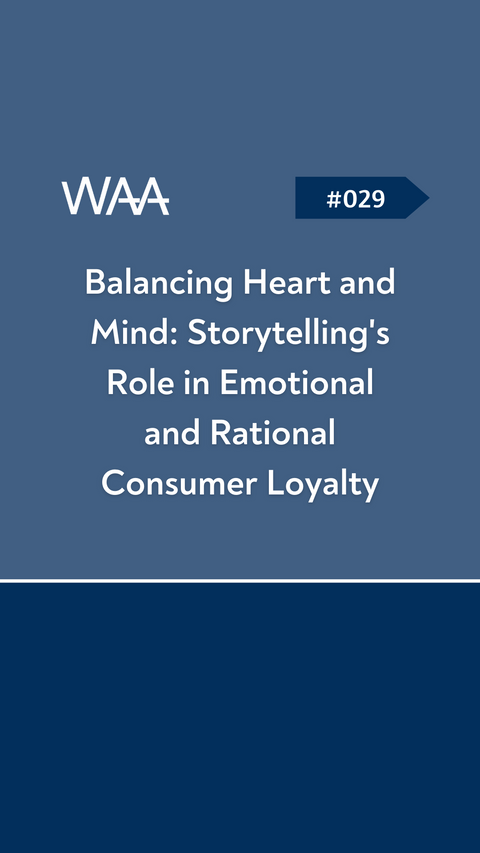
#029 Balancing Heart and Mind: Storytelling's Role in Emotional and Rational Consumer Loyalty
In the world of marketing and branding, building consumer loyalty is a top priority for businesses. Loyal customers not only make repeat purchases but also become brand advocates, spreading positive word-of-mouth and driving new customers to the business. However, understanding what drives consumer loyalty can be a complex task. One key aspect to consider is the role of emotions versus rational decision-making in the loyalty-building process. In this blog, we will explore the dynamics of emotional and rational decisions in consumer loyalty, and how storytelling can play a crucial role in enhancing both.
Emotional Decisions and Consumer Loyalty
Emotions play a powerful role in the decisions consumers make. In fact, many purchasing choices are driven by emotions rather than rational analysis. When consumers feel a strong emotional connection to a brand, they are more likely to remain loyal and continue supporting that brand over time. Emotional loyalty is built upon trust, empathy, and a sense of shared values. Businesses that can evoke positive emotions and connect with their customers on a deeper level have a greater chance of fostering long-term loyalty.
Rational Decisions and Consumer Loyalty
While emotions may play a significant role, rational decision-making also has its place in the consumer loyalty equation. Rational loyalty is driven by factors such as price, product features, convenience, and the overall value proposition. Consumers want to make informed decisions, and they consider tangible benefits when deciding where to spend their money. Businesses that can deliver on these rational factors while cultivating emotional connections can build a strong foundation for consumer loyalty.
The Role of Storytelling in Building Consumer Loyalty
Storytelling is a powerful tool that businesses can use to connect with consumers on both emotional and rational levels. By crafting compelling narratives and sharing meaningful stories, brands can create an emotional bond with their audience. These stories can evoke emotions, shape perceptions, and build a sense of community around a brand. Additionally, storytelling allows businesses to effectively communicate their product features, benefits, and overall value proposition, addressing the rational considerations of consumers.
Storytelling and Emotional Connection
Stories have a unique ability to tap into human emotions. By sharing authentic and relatable stories, businesses can create a sense of empathy and trust with their audience. Through storytelling, brands can demonstrate their values, purpose, and the positive impact they have on people's lives. These emotional connections are the foundation of loyalty, as consumers are more likely to remain loyal to brands that they feel understand and care about them.
Storytelling and Rational Considerations
In addition to emotional connections, storytelling can also address the rational considerations of consumers. By weaving product features, benefits, and value propositions into engaging narratives, businesses can educate and inform their audience in an interesting and memorable way. Stories help consumers understand how a product or service can solve their problems or enhance their lives, helping them make rational decisions with confidence.
Finding the Balance: Emotional and Rational Appeal
To effectively build consumer loyalty, businesses must strike a balance between emotional and rational appeal. By combining the power of emotional storytelling with a rational presentation of product benefits, businesses can enhance both aspects of the decision-making process. This approach ensures that customers feel emotionally connected to the brand while also perceiving the rational value in their purchases.
Final Thoughts
Building consumer loyalty requires understanding the interplay between emotional and rational decision-making. Emotions drive deep connections, while rational considerations ensure a logical basis for loyalty. By utilizing storytelling techniques, businesses can successfully connect with their audience on both emotional and rational levels, ultimately strengthening consumer loyalty. So, take the time to develop authentic and compelling brand stories that resonate with your target audience. By doing so, you can pave the way for long-term loyalty and build a community of dedicated brand advocates.
